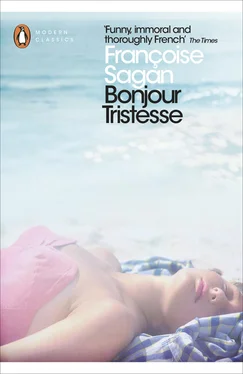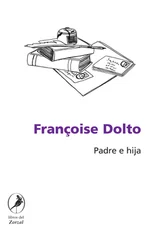At the villa the trio are contentedly idle. They swim and sunbathe; they are untroubled by the sense of duty or compunction. Raymond does beach exercises to diminish his belly. The beautiful, vapid, red-haired Elsa badly burns her skin. Cécile, who has recently failed her exams at the Sorbonne, lies on the beach running sand through her fingers: ‘I told myself that it was trickling away like time, and that it was facile to think like that and that it was pleasant having facile thoughts. It was summertime.’ One day, a young man capsizes his sailing boat in their creek – this is Cyril, an ardent, good-looking, conventional university student who offers to teach Cécile how to sail, and is the ideal prospect for a summer romance.
Chance, impulse, happenstance: this is how life unfolds in the unexamined world of Raymond and Cécile. They do not concern themselves with order and structure, the imposition of the will, the resistance to certain desires and the aspiration towards certain goals. Even Elsa merely submits to the sun’s power to burn her. Is this the correct way to live? The question does not arise; there is no one to ask it. Until, that is, Raymond announces one evening that he has invited a woman named Anne Larsen to stay. The first thing we learn about Anne is that she was a friend of Cécile’s dead mother. With the mother, the whole lost world of order, nurture and morality is powerfully invoked. Anne, it is clear, is the emissary of that world: ‘I knew that, as soon as Anne arrived, complete relaxation would no longer be possible,’ says Cécile. ‘Anne gave things a certain shape and words a certain sense that my father and I preferred to disregard. She set the standards for good taste and discretion and you couldn’t help detecting what these were in her sudden with-drawals, her lapses into pained silence or her use of particular expressions.’ Anne is beautiful, sophisticated, successful; and unlike Cécile, Raymond and Elsa, she is an adult, with an adult’s power of censure and moral judgement.
Cyril, too, is an adult – he is shocked by Raymond and Elsa’s ménage, and apologizes to Cécile for kissing her. ‘You have no protection against me … For all you know I could be a complete bastard,’ he says in a way that suggests he is anything but that. When Anne arrives, it is clear that she means to take Raymond and Cécile in hand. It is clear, too, that she is in love with Raymond, and that Raymond has reached for her in a bid to escape the pleasurable anomie of his circumstances and the childlike emotional world that he inhabits with Cécile. Elsa is dispatched; the mature, glacial, controlling Anne is installed. Soon she and Raymond announce their plans to marry; immediately, Anne begins to impose her will on Cécile. She orders her to eat more, to study in her room instead of going to the beach, to cease outright her relations with Cyril. Is this love or is it hatred? Is it nurture or is it control? Is it common sense, or the jealousy of a constricted older woman for her uninhibited step-daughter? Is it what Cécile has missed out on by not having a mother of her own, or what her motherlessness has exposed her to?
Sagan records clearly the effect the change in regime has on Cécile: ‘Yes, that was what I held against Anne: she prevented me from liking myself … because of her I was entering a world of reproaches and guilt … For the first time in my life this “self” of mine seemed to divide in two.’ In one sense, then, morality is a form of self-hatred; it is a wound one assuages by wounding others in precisely the same way. But Anne has done something else – she has stolen Cécile’s father, her one source of unconditional love. Raymond is now ‘growing away’ from his daughter; he ‘was abandoning me and rendering me defenceless’. Cécile the divided girl is forced into immorality: she wishes to get rid of Anne and regain Raymond. Her actual powerlessness gives rise to fantasies of power, and these thoughts cause her to oscillate between hatred and terrible guilt. Here, then, is another indictment of morality, as it is lived by Anne. Anne has fomented violence in Cécile’s pacific nature. By controlling and censuring her, and by interfering with her source of love, she has given her the capacity to do wrong.
This is a masterly portrait of primal human bonds and needs that cannot but be read as a critique of family life, the treatment of children, and the psychical consequences of different forms of upbringing. One day, Anne locks Cécile in her room, after an argument about schoolwork. At first Cécile panics, and flings herself at the door like a wild animal. Then her heart is hardened, her duplicity sealed: ‘I lay down on my bed and carefully drew up a plan.’ The form her revenge takes occupies the final section of the book, and is almost theatrical in its psychological grandeur. Cécile chooses as her tools her father’s childishness, Anne’s intransigence, Elsa’s vanity and Cyril’s responsible nature, and with them she forges a plot in which each of the four is utterly at her mercy. As a dramatist she experiences, for the first time, complete power over others. Her plot is tragic and bitter, but it plays uninterrupted to its end. Neither right nor wrong, neither conformity nor permissiveness, neither love nor hatred winds up the victor of this moral battle: it is insight, the writer’s greatest gift, that wins.
Sagan’s second novel, A Certain Smile , is in many ways a sequel to Bonjour Tristesse . Several of the familiar themes are there: the search for and betrayal of the lost mother; the double nature of father/lover and lover/brother; the defence of boredom or nothingness as a moral position more truthful than conventionality. Dominique, a law student at the Sorbonne, meets Luc, the married uncle of her boyfriend, Bertrand. Luc and his gentle, kindly wife, Françoise, take Dominique under their wing, for she is uncared-for and alone, the daughter of distant provincial parents rendered more remote by their unassuageable grief over the death some years earlier of ‘a son’, as Dominique expresses it. Like Cécile, Dominique struggles to maintain the dignity of her own reality, to assert its truth, however abnormal other people might claim to find it. ‘I was fine, and yet, inside of me, like some warm, living creature, there was always that hankering for languor, solitude and sometimes exaltation.
Luc quickly begins to make advances towards Dominique, even as Françoise is enveloping her in mother-love. Dominique profits from their attention, but can find no moral path through it, for the two forms of affection – sexual and parental – are confused. Luc proposes that Dominique come away with him and have a brief affair, at the end of which he will return to Françoise. Once again, the father-figure is identified with an aberrant morality that results in the girl’s betrayal of the mother-figure. More importantly, he denies her emotional reality: according to Luc, his affair with Dominique can proceed only on the basis that she does not love him. The nature of love is the novel’s central preoccupation. The uncanny maturity that made Sagan’s name as a novelist is most strongly in evidence in her fearless and astute portrayal of love as a psychical event that has its roots in family life and the early formation of personality. To the modern reader, Luc’s conduct towards Dominique has strong undercurrents of abuse: her violent emotional trauma in the aftermath of the affair, and the novel’s exquisitely ambivalent ending in which the subjective death and rebirth of Dominique is described, go far beyond poignancy or even frankness. ‘Something is rotten in the state of Denmark,’ Dominique finds her-self repeating, without knowing why. Sagan’s sense of emotional tragedy is indeed that of the great dramatists.
Читать дальше












